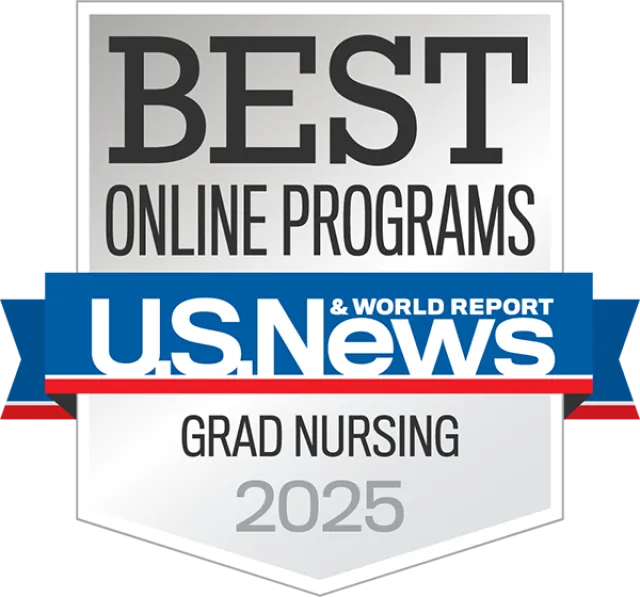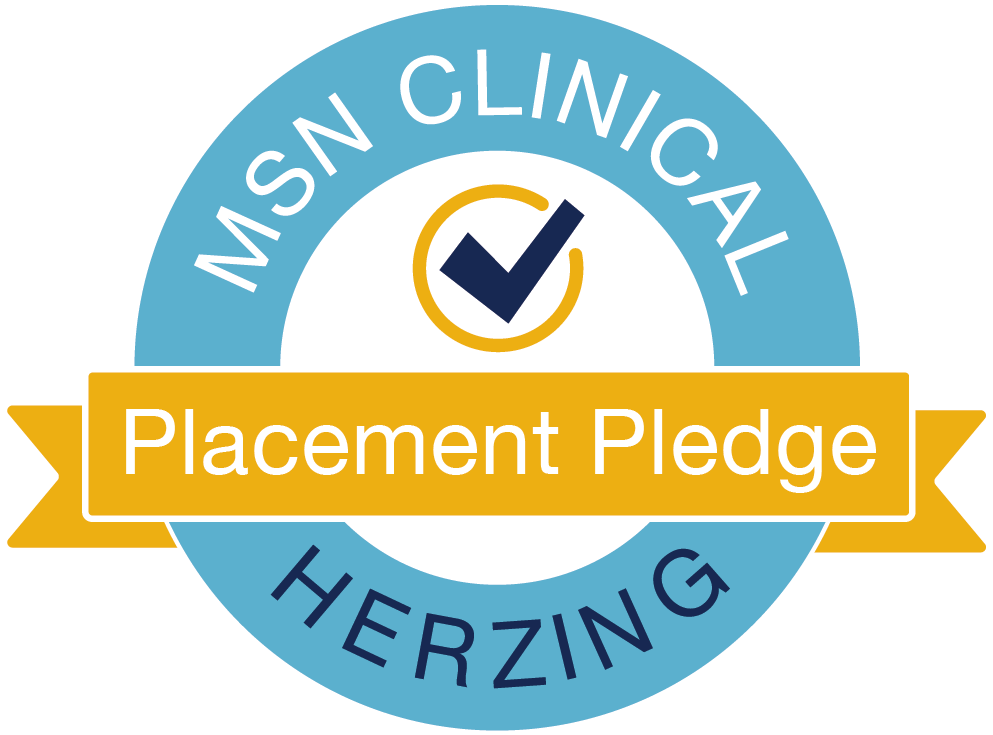Bridge from RN to MSN with Herzing University
| Accreditation | CCNE accredited,1 Accredited by the Higher Learning Commission |
|---|---|
| Clinicals | 630 clinical hours—we pledge your clinical placement! |
| Format | 100% online classes |
| Pathways | Choose your degree path: go from ADN to AGACNP in our accelerated RN to MSN program, or earn your BSN on the way (RN to BSN to AGACNP) |
| Dual credit | Earn dual credit towards a Doctor of Nursing Practice (DNP) |
| QuickPaths | 6 start dates with no wait list! Transfer credit, stackable credentials, and adaptive learning technology build a faster pathway to a higher education with Herzing University |
Learn More Today!

Ranked by U.S. News & World Report as one of the best online graduate nursing programs in 2025
Overview: Online RN to MSN-AGACNP Program Option
The RN to Master of Science in Nursing in Adult Gerontology Acute Care Nurse Practitioner degree is a 64-credit graduate program (RN to MSN) which prepares you for a career as an AGACNP. The online degree program provides students with fundamental knowledge and skills in nursing leadership and management, community health nursing, nursing informatics, health policy, skills and procedures for acute care, and much more.

Career-focused curriculum
Discover the crucial knowledge and skills required to succeed in your work and build a foundation for continued career growth.
Flexible schedule
We work hard to help you maintain school-life balance, striving to be as flexible as possible for busy non-traditional students.
Virtual services
Access to extensive virtual services, including academic advising, tutoring, support services, technical support and library services.
Lifelong support
We support your ongoing career advancement by providing comprehensive, personalized student services with lifelong career coaching.
Rolling admissions
No application deadlines to worry about. Apply when you’re ready and prepare to get started soon.
RN to MSN-AGACNP program classes & curriculum details
The program is designed to advance your undergraduate nursing study and seamlessly progress into graduate-level advanced practice nursing classes. Courses include bridge, core, specialty, and clinical courses.
All classes are delivered online with 630 total clinical hours.
How to go from RN to BSN to MSN-AGACNP
You may choose to stop for a BSN by combining our online RN to BSN and MSN-AGACNP degree programs. You can view their respective curriculums and course information here:
| Program | Months i | Semester Credits |
|---|---|---|
| Master of Science in Nursing (MSN) in Adult Gerontology Acute Care Nurse Practitioner – Accelerated RN to MSN (MSNAGACNPA) | 28 | 64 |
i. Average number of months for students to complete program.
Required Bridge Courses
All courses, 16.00 semester credit hours, are required prior to completing graduate level coursework.
Required Core Courses
All courses, 15.00 semester credit hours, are required.
Required Direct Care Courses
All courses, 9.00 semester credit hours, are required
Required Specialty Courses
All courses, 24.00 semester credit hours, are required.
Clinical Proficiency Exam and Policy
The following modules are 0.00 semester credit hours associated with the policy outlined above. Students are required to take as co-requisite module along with NU 611, NU 642, NU 664 or NU 671, depending on the program of study. Module Number Module Name Semester Credit Hours NSG 0600 Clinical Proficiency Module 0.00 NSG 0600R Clinical Proficiency Remediation Module (if needed) 0.00
Tuition & Cost
Tuition & Cost
The cost of tuition for the RN to MSN-AGACNP program option is $770 per credit.
You can potentially earn even greater savings by transferring credit from prior college coursework, applying for financial aid, or potential partnership opportunities through your employer.
Our goal is your career advancement. That’s why we are always working to improve our curriculum and processes to make our program as affordable as possible while preparing you best for success in your work.
Scholarships & Financial Aid
You may be eligible for multiple scholarships and grants—including our Nurses Circle of Achievement scholarship, which offers up to 10% tuition reduction.
Military/Veteran Discounts
Veterans, Active Duty U.S. Servicemembers, and spouses may qualify for a 10-20% tuition discount.
RN to MSN-AGACNP program option enrollment prerequisites
Enrollment requirements are the same whether you choose the accelerated RN to MSN-AGACNP or RN to BSN to MSN-AGACNP path. Prerequisites include:
- Live in a state where Herzing University is authorized to offer the RN to MSN program
- Hold a current, active and unrestricted license as a registered nurse (RN) in the same state in which they practice
- Hold an associate degree (ADN/ASN/AASN) in nursing from a nationally or regionally accredited college or university
- Participate in an interview to identify your goals and determine if the program is right for you
Eligible states for enrollment: Alabama, Alaska, Arizona, Arkansas, California, Colorado, Connecticut, Delaware, Florida, Georgia, Hawaii, Idaho, Illinois, Indiana, Iowa, Kentucky, Louisiana, Maine, Maryland, Massachusetts, Michigan, Minnesota, Mississippi, Missouri, Montana, Nebraska, Nevada, New Hampshire, New Jersey, New Mexico, North Carolina, North Dakota, Ohio, Oklahoma, Pennsylvania, Rhode Island, South Carolina, South Dakota, Tennessee, Texas, Utah, Vermont, Virginia, West Virginia, and Wisconsin.
Your clinical placement is our pledge.
We understand securing clinical placement as part of an AGACNP master's degree program is one of the biggest concerns students face. At Herzing, we offer guidance and support through our step-by-step Clinical Guidance Process to ensure you can get the clinical practice experiences you need.
As a Herzing student, we’ll encourage you to find your own preceptor and clinical sites as there are many benefits to doing so. However, we provide extensive support should you find difficulty along the way. With Herzing, you are never on your own.
Because of our strong relationships with healthcare providers across the U.S. and our comprehensive Clinical Guidance Process, we are confident in our ability to help you find clinical placement. So much so that if you are unable to find a clinical site on your own, we pledge to step in and help you secure clinical placement.*
* Subject to terms and conditions outlined in the enrollment documents.

Choose your path to go from RN to AGACNP
RN to BSN to MSN-AGACNP Path
Go from RN to BSN online, then work towards a master’s degree in nursing.
- Curriculum built to help you earn a BSN and MSN faster
- How long? 36 months on average
- Earn a bachelor’s degree that may be required by some employers
Accelerated RN to MSN-AGACNP
Bridge directly from ADN to AGACNP in the Herzing Accelerated RN to MSN program.
- Curriculum built to accelerate your MSN-AGACNP completion
- How long? As few as 28 months
- Best for nurses seeking to advance their practice and vault their career to the next level
Waived Enrollment Fee
Discover the educational pathway designed to maximize your career potential. Reach for greater heights with Herzing University.
Faq
Frequently Asked Questions
Didn't find the answer to your question? Send us an inquiry and we will be happy to answer all your questions!
While there are some similarities between the two main types of adult gerontology nurse practitioners, these are the biggest differences between primary care NPs and acute care NPs:
According to the Bureau of Labor Statistics, nurse practitioners earn an average salary of $132,000 per year ($63.46 per hour). Pay depends on many factors, including your location, what healthcare institution you work for and your level of experience.*
Discover the average nurse practitioner salary by state and find out what nurse practitioners make on average near you.
Nurse practitioners have an expanded scope of practice compared to registered nurses. In addition to RN duties, nurse practitioners may also write prescriptions, order lab tests, diagnose illnesses, and more (although specifics vary by state). NPs have greater autonomy in delivering patient care, and for that reason, the education requirement is higher.
Learn more about how to go from RN to nurse practitioner.
Here’s a selection of the most common types of nurse practitioners:
- Family Nurse Practitioner (FNP)
- Adult Gerontology Acute Care Nurse Practitioner (AGACNP)
- Adult Gerontology Primary Care Nurse Practitioner (AGPCNP)
- Pediatric Nurse Practitioner (PNP)
- Psychiatric Mental Health Nurse Practitioner (PMHNP)
- Women’s Health Nurse Practitioner (WHNP)
Each specialty has its own unique requirements in terms of job experience and certification.
Adult Gerontology Acute Care Nurse Practitioners provide care to adults and older adults with complex conditions in acute care and hospital settings. AGACNPs work with patients who are acutely ill, exhibit chronic medical conditions, or highly vulnerable to complications.
Job responsibilities include providing complex monitoring, stabilizing patients, ordering and interpreting diagnostic tests, and developing complex treatment plans.
Sometimes hospitals form partnerships with schools like ours to provide employees with unique benefits should they choose to pursue an advanced nursing degree.
Employees of Herzing partners can potentially earn college credit for prior work or military experience, transfer existing credit, or earn a scholarship to make going back to school more affordable.
If you are currently an RN considering becoming a nurse practitioner, view our educational partnerships or check with your employer for potential possibilities.
There are two primary differences between a Family Nurse Practitioner and an Adult Gerontology Acute Care Nurse Practitioner:
- Types of patients. FNPs work with patients across the patient lifespan, including children under the age of 13. As adult gerontology NPs, AGACNPs care for only adults ages 13 and above.
- Types of care. FNPs typically work in clinics, doctor’s offices, and other outpatient settings—and are not formally trained in acute and emergency care. Acute care NPs work in ICUs, hospitals and other inpatient settings to care for patients with trauma and more severe health issues.
If you have more interest in developing long-term relationships with patients, concerned more with preventative health, and love to work with children, FNP may be the best nurse practitioner career path for you.
We offer multiple options for current nurses of all types, including pathways for ASN/ADN, BSN, and MSN degree holders.
View our available online Adult Gerontology Acute Care Nurse Practitioner programs.
Program Finder
RN to MSN - Adult Gerontology Acute Care Nurse Practitioner
OnlineTo learn more about this program, click the Request Info button.

Choose your NP pathway
Considering all of your options for nurse practitioner specialties?
Herzing University offers multiple nurse practitioner programs for current nurses holding an associate, bachelor's, or master's degree in nursing.
Our goal is to help you walk your career path no matter where you are, or where you want to go.
Explore Herzing NP programsAccreditation & Disclosures
1. The master's degree program in nursing at Herzing University Madison is accredited by the Commission on Collegiate Nursing Education (http://www.ccneaccreditation.org). Herzing University is approved to offer programs in an online learning modality through association with the main campus in Madison, Wisconsin.
Herzing University is accredited by the Higher Learning Commission (hlcommission.org), an institutional accreditation agency recognized by the U.S. Department of Education.
* BLS pay estimates calculate the median annual wage for various occupations. Per the BLS the median wage for an occupation is: "The wage at which half of the workers in the occupation earned more than that amount, and half earned less. Median wage data are from the BLS Occupational Employment and Wage Statistics survey." Bureau of Labor Statistics (BLS), U.S. Department of Labor, Occupational Outlook Handbook 2024. BLS median wage estimates do not represent entry-level wages and/or salaries. Multiple factors, including prior experience, age, geographic market in which you want to work, and degree level and field, will affect career outcomes, including starting salary and earnings as an experienced employee. Herzing neither represents that its graduates will earn the median salaries calculated by BLS for a particular job nor guarantees that graduation from its program will result in a job, promotion, particular wage or salary, or other career growth.
Recent Blog Posts
Waived Enrollment Fee
Discover the educational pathway designed to maximize your career potential. Reach for greater heights with Herzing University.






